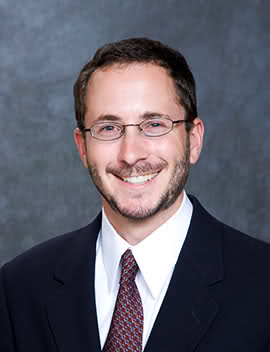
While Associate Professor Jeff Schwartz sees some value for consumers in President Obama’s financial reform package passed last year, he argues that the legislation doesn’t go far enough to protect investors from unforeseen disasters in the marketplace.
Schwartz, the UC Berkeley-trained lawyer who left the world of private corporate and securities law in Los Angeles to join the California Western faculty in 2009, acknowledges that the new law achieved a handful of key goals, but is concerned that it leaves average American investors as vulnerable as they were before the onset of the "Great Recession."
One of the pluses Schwartz sees was the increased transparency provided by new requirements that certain financial transactions be carried out through public exchanges.
But in terms of hedge fund and mutual fund reform, Schwartz was disappointed. This is an area in which Schwartz has increasingly become a leading advocate for change, and he has published a number of papers in major law journals outlining how the system could be improved.
"The whole area of fund management regulation needs to be rewritten. Many highly-regulated mutual funds are a rip-off for average investors because actively managed funds fail to deliver the kind of returns that justify their costs. And the best managers flock to completely unregulated hedge funds to make the big money, while ordinary investors are shut out of these vehicles."
Schwartz is a unique voice because he proposes taking specific steps to protect investors against market volatility, a topic almost no one else is even discussing, let alone addressing.
"It's a huge issue that hangs over all of our heads and periodically shakes our system to its foundation. In addition, I argue that stock market volatility raises fairness concerns. Stock market gains or losses are largely a matter of chance. People who started putting their money in the market five years ago have lost a great deal. People who put their money in the market 50 years ago and took it out in 2007 saw a huge return, and there’s no rhyme or reason to it."
Ironically, Schwartz does not think changes in securities law would provide the solution he's looking for. Instead, he calls for a broader rethink of the current paradigm where savers are forced to rely on inherently risky financial assets to fund long-term goals. He also discusses the benefits of insuring market returns.
"The reason I'm skeptical about using laws to protect against volatility is that they tend to be backwards looking, because they usually come right after a collapse. But as memories of burst bubbles fade, and those new laws put in place are gradually eroded, neutralized by special interests, or fail to address new investment vehicles, we become vulnerable all over again.
"To me the problem is similar to an unforeseen natural disaster. We can’t prevent earthquakes from happening, but we created earthquake insurance to mitigate the impact. We’ll never be able to predict or prevent financial shocks, but perhaps we can create a system that allows people to acquire financial investment insurance instead of watching their life savings suffer through destructive rollercoaster rides as the economy goes through its inevitable up and down cycles."